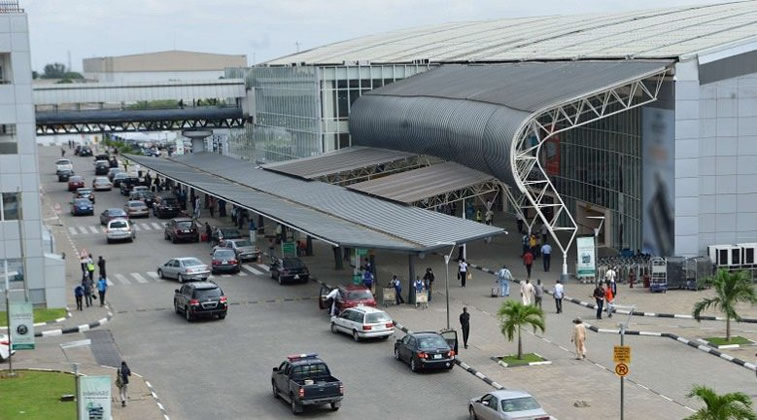
The delay in government approval for using the Murtala Muhammed Airport Terminal Two for regional flights is raising concerns among stakeholders, JUSTICE OKAMGBA reports
Aviation stakeholders have called the government and Bi-Courtney Aviation Services Limited to resolve issue delaying the commencement of regional flights at Murtala Muhammed Airport Terminal 2. They claimed that having a private terminal operating regional flights would be a win-win for the government, airlines and travellers.
It has been suggested that allowing MMA2 to handle regional flights would offer several benefits. Firstly, it would eliminate the need for passengers to move between terminal airports to catch their connecting local flights, thus reducing stress and hassle. Additionally, local airlines that operate regional flights would save on costs, as they currently have to pay separate fees to two terminal operators for their local and regional operations.
Sources within the industry who spoke to The PUNCH, stressed the importance of improved collaboration among the Federal Airports Authority of Nigeria, the Nigeria Civil Aviation Authority, and BASL.
BASL, the operator of MMA2, claimed to have invested at least N600m in readiness to kickstart regional operations at the terminal.
Regional flights, which involve air travel services operating within the African region, are central to this initiative.
In May 2007, BASL completed and opened the MMA2 facility under the Build, Operate, and Transfer agreement with the FAAN.
The BOT agreement is a contractual arrangement between a private entity (BASL) and a government (FAAN) or public authority for the development, operation, and eventual transfer of infrastructure projects.
While MMA2 focuses on domestic operations, it plays a crucial role in facilitating travel within Nigeria by hosting airlines like Air Peace, Arik Air, Dana Air, and others that operate domestic flights to destinations such as Abuja, Port Harcourt, Owerri, Enugu, Calabar, Warri, and more.
In 2016, BASL’s MMA2 was certified for regional flight operations by the Ministerial Committee on Airport Security and received regulatory approval to commence regional services.
The industry regulator, the Nigeria Civil Aviation Authority, was among the agencies that had inspected the terminal, but it had yet to grant final approval to kick-start regional flights.
A former commandant of the Murtala Muhammed International Airport, Lagos, Group Captain John Ojikutu, argued that the delay in getting regional flight approval was linked to political factors.
He told The PUNCH that the conflict between the government and the BASL relates to the mismanagement of aviation agencies and the need for change to support growth and improvement.
The captain believed that addressing these issues could lead to better outcomes for the aviation industry.
He explained, “Nothing but politics of the political office holders that held onto the national carrier, that held on to reviewing the multiple destinations given to the foreign airlines, that held on to designating flag carriers from the private airlines in the country, that also held on to the airport concessions, etc. The political officeholders are the ones benefiting from all this.
Ojikutu lamented that there had been numerous changes in leadership positions within the government, including several strong leaders.
“Imagine a minister building multiple layers of car parks beside airport terminal buildings with no enforcement of security regulations.
“The fight with BASL is about those in the administration of our government and the management of the aviation agencies. It must end, and I believe it will end soon if we want development and progress,” he stated.
The terminal can accommodate four million passengers per year. It currently manages over 50 flights a day to various destinations in Nigeria, handling approximately 75 per cent of domestic flights in Lagos.
MMA2, inaugurated on April 7, 2007, saw flight operations commence on May 7, 2007.
Speaking with The PUNCH, the Assistant General of the Aviation Safety Round Table, Olumide Ohunayo, emphasized the pressing need for an improved relationship between Bi-Courtney and FAAN, given the ongoing issues.
Despite acknowledging Bi-Courtney’s significant accomplishments and readiness for regional flights, Ohunayo cautioned that such a transition cannot happen overnight.
He pointed out the existence of numerous lawsuits and strained relations between FAAN and other agencies, underscoring unresolved issues and multiple court judgments against FAAN.
Adding to the complexity is the pending resolution of the constitutional agreement.
The relationship between FAAN and BASL has encountered challenges, with FAAN being accused of disregarding court decisions and failing to adhere to contractual agreements.
These disputes have persisted for over 14 years since the establishment of the Build, Operate, and Transfer (BOT) concession agreement between the two parties.
BASL has refuted claims of owing FAAN substantial amounts, asserting that FAAN owes them over N200bn due to alleged deprivation of legitimate earnings over the years.
Ohunayo firmly stated that discussing regional flights amid those challenges was premature and highlighted the crucial importance of addressing these relationship issues first.
Ohunayo stated that after the resolution, attention can shift to the synergy and facilitation of moving passengers out of the country without passing major roads.
“These issues must be addressed first. I still do not know how they will transport passengers. Will they use the major road to the toll gate, or find a pathway within to reach the terminal? It’s still unclear.”
A former President of the National Association of Aircraft Pilots and Engineers, Ayuba Kyari, told The PUNCH that the Federal Government, through the NCAA, may be reluctant to grant final approval to BASL due to the size of the terminal.
He explained that the NCAA had certain criteria or guidelines related to the size of terminals that they regulate, which could affect the approval process for regional flight operations at MMA2.
The aircraft engineer warned that there has to be a total separation in the perimeter fencing to barricade domestic access to MMA 2 for regional operations.
Kyari claimed that if the current MMA1 is expanded, the government might willingly and expeditiously approve the use of the MMA 2 terminal.
He noted, “The question of the NCAA not approving BASL to use their terminal for regional operations might have a lot to do with security and the idea of having both domestic and regional operations together in a small terminal like MMA2.
“If regional operation here refers to flights to and from the African region, then the terminal is small. If BASL is to handle only regional operations, then MMA 1 (GAT) can’t be enough for domestic operations. With the above, the Federal Government through the NCAA will be very reluctant to approve MMA2 for regional operations for now,” Kyari noted.
In the past, the leadership of the National Union of Air Transport Employees urged the NCAA to decline BASL’s proposal to start regional flights from the terminal, citing space constraints.
BASL 2024 optimism
In August 2023, the Head of Operations at BASL, Blessing Ewah, underscored the readiness of the terminal, with gates 5 and 6 specifically allocated for regional flights.
Ewah claimed that BASL had invested over N600m in facility upgrades since 2014 without any returns.
The operational head said that all essential infrastructure and standards for regional operations were in place, expressing optimism about starting regional operations in 2024.
Experts said regional flights at the terminal would decongest Lagos airport, enhance connectivity, and optimise revenue streams for airlines and concessionaires, which are crucial factors.
The potential commencement of regional operations at MMA2 is viewed as a positive step toward improving the passenger experience, increasing revenue, and fostering growth in Nigeria’s aviation sector.
Last year, the Chairman of BASL, Wale Babalakin, after inaugurating ‘The Art Experience’ (Art Gallery) in MMA2, lamented the persistent delays in starting regional operations from the terminal.
The chairman said there were concerns that, after completing all necessary procedures for their regional operations, they were unable to commence.
According to Babalakin, it means that the General Aviation Terminal at MMA 1 was continuing to operate unlawfully since, as per the ruling of the Supreme Court, the terminal falls under their jurisdiction.
“So, I hope that those who have power and who have constitutional authority know that enterprises are encouraged when the rule of law is followed.
“Once you follow the rule of law, your country will become an investment destination, but if people are looking at us from afar, seeing simple agreements not being honored, it puts us in a negative light, and it is not good for anybody in the country,” Babalakin said.
Despite facing obstacles, BASL remains optimistic about initiating regional flights from MMA2 this year, emphasising the importance of utilising the existing infrastructure efficiently.
In January, the Head of Aeronautical and Cargo Services, Remi Jibodu, told journalists in Lagos that the MMA2 planned to commence regional operations in 2024 to extend the bespoke customer experience to regional passengers.
Analysts anticipated that once the NCAA grants approval for local airlines to start regional flight operations in Nigeria, this initiative would boost revenue and employment opportunities for both local airlines and the broader aviation sector.
Jibodu mentioned that authorising regional operations at MMA2 would enhance investors’ trust in conducting business in Nigeria.
He revealed ongoing efforts to enlarge the MMA2 apron to accommodate additional aircraft.
“The management is also in discussions with airlines to eliminate inoperative aircraft that hinder the apron’s capacity utilisation,” he added.





